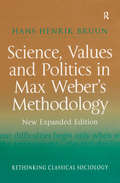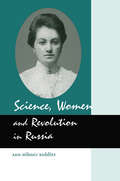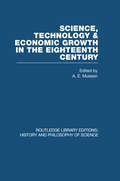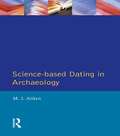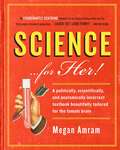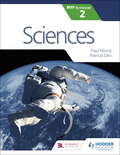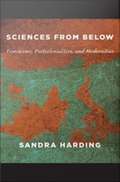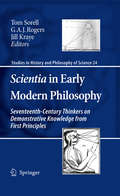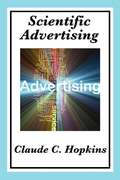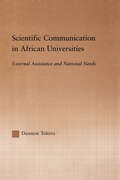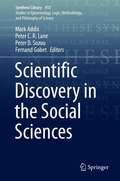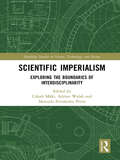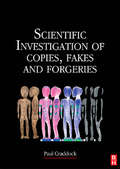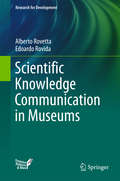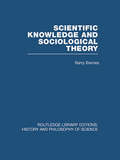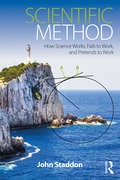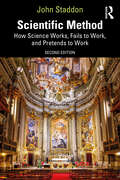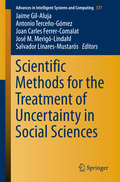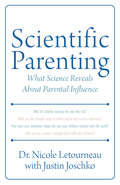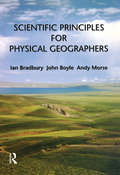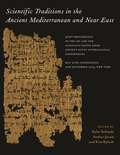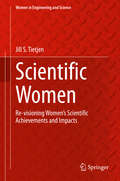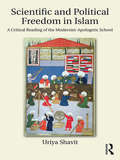- Table View
- List View
Science, Values and Politics in Max Weber's Methodology: New Expanded Edition (Rethinking Classical Sociology)
by Hans Henrik BruunFirst published in 1972, this book on Weber's methodological writings is today regarded as a modern classic in its field. In this new expanded edition, the author has revised and updated the original text, and translated the numerous German quotations into English. He has also added a new introduction, where he discusses major issues raised in the relevant secondary literature since 1972. The author traces the relationship between values and science in Max Weber's methodology of its central aspects: value freedom, value relation (Wertbeziehung), value analysis, the ideal type and the special problems which pertain to the sphere of politics. Weber's thought is presented and discussed on the basis of a meticulous analysis of all available, published or unpublished, original material. The book is indispensable for all serious Weber scholars and provides the general student with a clear, accessible and authoritative exposition of major aspects of Weber's methodology.
Science, Women and Revolution in Russia
by KoblitzWhile the women's movement might seem like a relatively new concept, Russian women of the 1860s deserve to be acknowledged as individuals who changed the direction of science and opened the doors of higher education to women throughout Europe. The 1860's and 1870's witnessed a rise in women's consciousness and the beginnings of the Russian revolutionary movement that saw women pursue and receive doctorates in many areas of science. These same women went on to become some of the brightest in their fields. This book provides a look at Russian women scientists of the 1860's, their personal independence, and technical and literary achievements that made science the popular social movement of the time and changed the face of the Russian intellectual culture.
Science, technology and economic growth in the eighteenth century
by A E MussonOriginally published in 1972.This book illustrates the growing awareness of the importance of science and technology in the Industrial Revolution. The contributors show that the growth in the teaching and literature of natural philosophy (mechanics, hydraulics etc), mathematics and chemistry, together with such new agencies as "philosophical societies", itinerant lecturers and libraries were significant factors in the development of the Industrial Revolution.
Science-Based Dating in Archaeology (Longman Archaeology Series)
by M. J. AitkenArchaeologists and archaeology students have long since needed an authoritative account of the techniques now available to them, designed to be understood by non-scientists. This book fills the gap and it offers a two-tier approach to the subject. The main text is a coherent introduction to the whole field of science-based dating, written in plain langauge for non-scientists. Additional end-notes, however, offer a a more technical understanding, and cater for those who have a scientific and mathematical background.
Science...For Her!
by Megan AmramMegan Amram, one of Forbes' "30 Under 30 in Hollywood & Entertainment," Rolling Stone's "25 Funniest People on Twitter," and a writer for NBC's hit show Parks and Recreation, delivers a politically, scientifically, and anatomically incorrect "textbook" that will have women screaming with laughter, and men dying to know what the noise is about.In the vein of faux expert books by John Hodgman and Amy Sedaris, Science...for Her! is ostensibly a book of science written by a denizen of women's magazines. Comedy writer and Twitter sensation Megan Amram showcases her fiendish wit with a pitch-perfect attack on everything from those insanely perky tips for self-improvement to our bizarre shopaholic dating culture to the socially mandated pursuit of mind-blowing sex to the cringe-worthy secret codes of food and body issues. Part hilarious farce, part biting gender commentary, Amram blends Cosmo and science to highlight absurdities with a machine-gun of laugh-inducing lines that leave nothing and no one unscathed. Subjects include: this Spring's ten most glamorous ways to die; tips for hosting your own big bang; what religion is right for your body type; and the most pressing issue facing women today: kale!!! Be prepared to laugh about anything in this outrageous satirical gem.
Science: Technology and Society Sourcebook
by Holt Rinehart Winston StaffScienceplus Sourcebook for High School
Sciences for the IB MYP 2
by Paul Morris Patricia DeoA concept-driven and assessment-focused approach to Sciences teaching and learning.- Approaches each chapter with statements of inquiry framed by key and related concepts, set in a global context- Supports every aspect of assessment using tasks designed by an experienced MYP educator- Differentiates and extends learning with research projects and interdisciplinary opportunities- Applies global contexts in meaningful ways to offer an MYP Sciences programme with an internationally-minded perspectiveContents list1 Where are we now and where are we going? 2 How do we map matter?3 Who are we? 4 How can we find out? 5 How does our planet work?6 How do we respond to our world?
Sciences from Below: Feminisms, Postcolonialities, and Modernities
by Sandra HardingIn Sciences from Below, the esteemed feminist science studies scholar Sandra Harding synthesizes modernity studies with progressive tendencies in science and technology studies to suggest how scientific and technological pursuits might be more productively linked to social justice projects around the world. Harding illuminates the idea of multiple modernities as well as the major contributions of post-Kuhnian Western, feminist, and postcolonial science studies. She explains how these schools of thought can help those seeking to implement progressive social projects refine their thinking to overcome limiting ideas about what modernity and modernization are, the objectivity of scientific knowledge, patriarchy, and Eurocentricity. She also reveals how ideas about gender and colonialism frame the conventional contrast between modernity and tradition. As she has done before, Harding points the way forward in Sciences from Below. Describing the work of the post-Kuhnian science studies scholars Bruno Latour, Ulrich Beck, and the team of Michael Gibbons, Helga Nowtony, and Peter Scott, Harding reveals how, from different perspectives, they provide useful resources for rethinking the modernity versus tradition binary and its effects on the production of scientific knowledge. Yet, for the most part, they do not take feminist or postcolonial critiques into account. As Harding demonstrates, feminist science studies and postcolonial science studies have vital contributions to make; they bring to light not only the male supremacist investments in the Western conception of modernity and the historical and epistemological bases of Western science but also the empirical knowledge traditions of the global South. Sciences from Below is a clear and compelling argument that modernity studies and post-Kuhnian, feminist, and postcolonial sciences studies each have something important, and necessary, to offer to those formulating socially progressive scientific research and policy.
Sciences of Modernism
by Paul PeppisSciences of Modernism examines key points of contact between British literature and the human sciences of ethnography, sexology, and psychology at the dawn of the twentieth century. The book is divided into sections that pair exemplary scientific texts from the period with literary ones, charting numerous collaborations and competitions occurring between science and early modernist literature. Paul Peppis investigates this exchange through close readings of literary works by Claude McKay, E. M. Forster, Mina Loy, Rebecca West, and Wilfred Owen alongside science books by Alfred Haddon, Havelock Ellis, Marie Stopes, Bernard Hart, and William Brown. In so doing, Peppis shows how these competing disciplines participated in the formation and consolidation of modernism as a broad cultural movement across a range of critical discourses. His study will interest students and scholars of the history of science, literary modernism, and English literature more broadly.
Scientia in Early Modern Philosophy
by Tom Sorell Jill Kraye G. A. RogersScientia is the term that early modern philosophers applied to a certain kind of demonstrative knowledge, the kind whose starting points were appropriate first principles. In pre-modern philosophy, too, scientia was the name for demonstrative knowledge from first principles. But pre-modern and early modern conceptions differ systematically from one another. This book offers a variety of glimpses of this difference by exploring the works of individual philosophers as well as philosophical movements and groupings of the period. Some of the figures are transitional, falling neatly on neither side of the allegiances usually marked by the scholastic/modern distinction. Among the philosophers whose views on scientia are surveyed are Hobbes, Descartes, Spinoza, Gassendi, Locke, and Jungius. The contributors are among the best-known and most influential historians of early modern philosophy.
Scientific Advertising
by Claude C. HopkinsThe time has come when advertising has in some hands reached the status of a science. It is based on fixed principles and is reasonably exact. The causes and effects have been analyzed until they are well understood. The correct method of procedure have been proved and established. We know what is most effective, and we act on basic law. Advertising, once a gamble, has thus become, under able direction, one of the safest business ventures. Certainly no other enterprise with comparable possibilities need involve so little risk. Therefore, this book deals, not with theories and opinions, but with well-proved principles and facts. It is written as a text book for students and a safe guide for advertisers. Every statement has been weighed. The book is confined to establish fundamentals.
Scientific Communication in African Universities: External Assistance and National Needs (RoutledgeFalmer Studies in Higher Education)
by Damtew TeferraFirst Published in 2003. Routledge is an imprint of Taylor & Francis, an informa company.
Scientific Discovery in the Social Sciences (Synthese Library #413)
by Fernand Gobet Mark Addis Peter C. R. Lane Peter D. SozouThis volume offers selected papers exploring issues arising from scientific discovery in the social sciences. It features a range of disciplines including behavioural sciences, computer science, finance, and statistics with an emphasis on philosophy.The first of the three parts examines methods of social scientific discovery. Chapters investigate the nature of causal analysis, philosophical issues around scale development in behavioural science research, imagination in social scientific practice, and relationships between paradigms of inquiry and scientific fraud. The next part considers the practice of social science discovery. Chapters discuss the lack of genuine scientific discovery in finance where hypotheses concern the cheapness of securities, the logic of scientific discovery in macroeconomics, and the nature of that what discovery with the Solidarity movement as a case study. The final part covers formalising theories in social science. Chapters analyse the abstract model theory of institutions as a way of representing the structure of scientific theories, the semi-automatic generation of cognitive science theories, and computational process models in the social sciences.The volume offers a unique perspective on scientific discovery in the social sciences. It will engage scholars and students with a multidisciplinary interest in the philosophy of science and social science.
Scientific Imperialism: Exploring the Boundaries of Interdisciplinarity (Routledge Studies in Science, Technology and Society)
by Uskali Mäki Adrian Walsh Manuela Fernández PintoThe growing body of research on interdisciplinarity has encouraged a more in depth analysis of the relations that hold among academic disciplines. In particular, the incursion of one scientific discipline into another discipline’s traditional domain, also known as scientific imperialism, has been a matter of increasing debate. Following this trend, Scientific Imperialism aims to bring together philosophers of science and historians of science interested in the topic of scientific imperialism and, in particular, interested in the conceptual clarification, empirical identification, and normative assessment of the idea of scientific imperialism. Thus, this innovative volume has two main goals. Indeed, the authors first seek to understand interdisciplinary relations emerging from the incursion of one scientific discipline into one or more other disciplines, such as in cases in which the conventions and procedures of one discipline or field are imposed on other fields; or more weakly when a scientific discipline seeks to explain phenomena that are traditionally considered proper of another discipline’s domain. Secondly, the authors explore ways of distinguishing imperialistic from non-imperialistic interactions between disciplines and research fields. The first sustained study of scientific imperialism, this volume will appeal to postgraduate students and postdoctoral researchers interested in fields such as Science and Technology Studies, Sociology of Science & Technology, Philosophy of Science, and History of Science.
Scientific Investigation of Copies, Fakes and Forgeries
by Paul CraddockThe faking and forgery of works of art and antiquities is probably now more extensive than ever before. The frauds are aided by new technologies, from ink jet printers to epoxy resins, and driven by the astronomic prices realised on the global market. This book aims to provide a comprehensive survey of the subject over a wide range of materials, emphasising how the fakes and forgeries are produced and how they may be detected by technical and scientific examination. The subject is exemplified by numerous case studies, some turning out not to be as conclusive as is sometimes believed. The book is aimed at those likely to have a serious interest in these investigations, be they curator, collector, conservator or scientist. Paul Craddock has recently retired from the Department of Conservation, Documentation and Science at the British Museum, where he was a materials scientist.
Scientific Knowledge Communication in Museums (Research For Development Ser.)
by Edoardo Rovida Alberto RovettaThis book explains the general principles of scientific and technical communication in the context of modern museums. It also examines, with the aid of informative case studies, the different means by which knowledge can be transmitted, including posters, objects, explanatory guidance, documentation, and catalogues. Highlighting the ever more important role of multimedia and virtual reality components in communicating understanding of and facilitating interaction with the displayed object, it explores how network communications systems and algorithms can be applied to offer individual users the information that is most pertinent to them. The book is supported by a Dynamic Museums app connected to museum databases where series of objects can be viewed via cloud computing and the Internet and printed using 3D printing technology. This book is of interest to a diverse readership, including all those who are responsible for museums’ collections, operations, and communications as well as those delivering or participating in courses on museums and their use, communication design and related topics.
Scientific Knowledge and Sociological Theory (Routledge Library Editions: History & Philosophy of Science)
by Barry BarnesOriginally published in 1974. Scientific Knowledge and Sociological Theory centres on the problem of explaining the manifest variety and contrast in the beliefs about nature held in different groups and societies. It maintains that the sociologist should treat all beliefs symmetrically and must investigate and account for allegedly "correct" or "scientific" beliefs just as he would "incorrect" or "unscientific" ones. From this basic position a study of scientific beliefs is constructed. The sociological interest of such beliefs is illustrated and a sociological perspective upon scientific change is developed.
Scientific Method: How Science Works, Fails to Work, and Pretends to Work
by John StaddonThis book shows how science works, fails to work, or pretends to work, by looking at examples from such diverse fields as physics, biomedicine, psychology, and economics. Social science affects our lives every day through the predictions of experts and the rules and regulations they devise. Sciences like economics, sociology and health are subject to more ‘operating limitations’ than classical fields like physics or chemistry or biology. Yet, their methods and results must also be judged according to the same scientific standards. Every literate citizen should understand these standards and be able to tell the difference between good science and bad. Scientific Method enables readers to develop a critical, informed view of scientific practice by discussing concrete examples of how real scientists have approached the problems of their fields. It is ideal for students and professionals trying to make sense of the role of science in society, and of the meaning, value, and limitations of scientific methodology in the social sciences.
Scientific Method: How Science Works, Fails to Work, and Pretends to Work
by John StaddonThis expanded second edition of Scientific Method shows how science works, fails to work or pretends to work by looking at examples from physics, biomedicine, psychology, sociology and economics.Scientific Method aims to help curious readers understand the idea of science, not by learning a list of techniques but through examples both historical and contemporary. Staddon affirms that if the reader can understand successful studies as well as studies that appear to be scientific but are not, they will become a better judge of the “science” in circulation today. To this end, this new edition includes a new chapter, What is Science?, which points out that science, like any human activity, has its own set of values, with truth being the core. Other new chapters focus on the emergence of AI and machine learning, science and diversity, and behavioral economics. The book also includes textual features such as bullet-points and text boxes on topical issues.Scientific Method is essential reading for students and professionals trying to make sense of the role of science in society, and of the meaning, value and limitations of scientific methodology.
Scientific Methods for the Treatment of Uncertainty in Social Sciences
by José M. Merigó-Lindahl Jaime Gil-Aluja Antonio Terceño-Gómez Joan Carles Ferrer-Comalat Salvador Linares-MustarósThis book is a collection of selected papers presented at the SIGEF conference, held at the Faculty of Economics and Business of the University of Girona (Spain), 06-08 July, 2015. This edition of the conference has been presented with the slogan "Scientific methods for the treatment of uncertainty in social sciences". There are different ways for dealing with uncertainty in management. The book focuses on soft computing theories and their role in assessing uncertainty in a complex world. It gives a comprehensive overview of quantitative management topics and discusses some of the most recent developments in all the areas of business and management in soft computing including Decision Making, Expert Systems and Forgotten Effects Theory, Forecasting Models, Fuzzy Logic and Fuzzy Sets, Modelling and Simulation Techniques, Neural Networks and Genetic Algorithms and Optimization and Control. The book might be of great interest for anyone working in the area of management and business economics and might be especially useful for scientists and graduate students doing research in these fields.
Scientific Parenting: What Science Reveals About Parental Influence
by Dr Nicole Letourneau Justin JoschkoThe latest research on child development may hold the key to the parenting of the future. Combining the expertise of its author – a celebrated expert in parent-infant mental health and mother of two – with the latest findings in gene-by-environment interactions, epigenetics, behavioural science, and attachment theory, Scientific Parenting describes how children’s genes determine their sensitivity to good or bad parenting, how environmental cues can switch critical genes on or off, and how addictive tendencies and mental health problems can become hardwired into the human brain. The book traces conditions as diverse as heart disease, obesity, and depression to their origins in early childhood. It brings readers to the frontier of developmental research, unlocking the fascinating scientific discoveries currently hidden away in academic tomes and scholarly journals. Above all, Scientific Parenting explains why parenting really matters and how parents’ smallest actions can transform their children’s lives.
Scientific Principles for Physical Geographers
by Ian Bradbury John Boyle Andy MorseScience for Geography and Environment introduces students (and academics who need to brush up their knowledge!) to scientific principles in a lively and accessible way, allowing them to proceed through the text at their own pace. The book is structured thematically with a logical development of key topics, all linked by a comprehensive cross-referencing system. Concepts and principles will be grounded in everyday experience and exemplified by reference to geographical/environmental processes. The authors are also testing each stage of the text on their own students, thereby ensuring that student needs are given top priority in the book's development. Lively and relevant introduction to those scientific principles necessary to understand key processes occuring within the natural environment.
Scientific Traditions in the Ancient Mediterranean and Near East: Joint Proceedings of the 1st and 2nd Scientific Papyri from Ancient Egypt International Conferences, May 2018, Copenhagen, and September 2019, New York (ISAW Monographs)
by Sofie Schiødt Amber Jacob Kim RyholtComparative insights on astronomy, divination, and medicine from ancient textsScientific Traditions in the Ancient Mediterranean and Near East presents a collection of articles by leading scholars on scientific practices in the ancient world, with emphasis on the fields of medicine, astronomy, astrology, and other forms of divination. The essays engage with a wide variety of textual sources in many different languages and scripts from Egypt and the Near East spanning more than a millennium, including some texts that are edited and discussed here for the first time. The contributors to this volume were tasked with approaching their texts not only as specialists, but also from a cross-cultural perspective, and the resulting body of work reveals new and exciting evidence for the transfer of scientific knowledge across cultural borders in the ancient Mediterranean and Near East.This book will be of interest primarily to specialists in the history of medicine, science, divination, and magic, as well as to papyrologists, Egyptologists, and Assyriologists.
Scientific Women: Re-visioning Women’s Scientific Achievements and Impacts (Women in Engineering and Science)
by Jill S TietjenThe book highlights women’s contributions to science, which have often been marginalized and overlooked throughout history. The book first provides an overview of the development of the various science professions over time - placed in socioeconomic and cultural contexts - and women’s role in the sciences throughout history. The author then exemplifies - through history, example, and case studies - that although women were denied a scientific education until fairly recently in our history, they have nevertheless demonstrated intellect and capability in mathematics, physical sciences, life sciences, social sciences, and computer sciences throughout time. Biographies of women who contributed to these fields since before the Common Era are interwoven into a discussion of the development of the scientific profession, the advancement of education, the professionalization of the various scientific occupations, and the advancement of women in society. This book is a follow up to the author's book “Engineering Women: Re-visioning Women's Scientific Achievements and Impacts” (Springer 2017). The author, Jill Tietjen, is the series editor for Springer’s Women in Engineering and Science book series.Illuminates the many significant contributions of women in the sciences;Educates readers about the evolution of women’s participation in the scientific fields over the last century;Demonstrates how key scientific advances are driven by socio-economic and cultural contexts.
Scientific and Political Freedom in Islam: A Critical Reading of the Modernist-Apologetic School
by Uriya ShavitThe modernist-apologetic approach to the relation between revelation and science and politics has been a central part of Arab discourses on the future of Muslim societies for over a century. This approach introduced historical and theological narratives and interpretative mechanisms that contextualize reason and freedom in Islamic terms to argue that, unlike with Christianity, it is possible for Muslim societies to be technologically and politically advanced without forfeiting revelation as an all-encompassing, legally-binding guide. ‘Scientific and Political Freedom in Islam’ critically examines the coherence and consistency of modernist-apologetic scholars. This is done through a discussion of their general theorizing on reason and freedom, which is then followed by discussions of their commentaries on specific scientific and political issues in light of their general theorizing. Regarding the former, the focus is Darwin’s theory of evolution, while the universality of the "Biblical flood," the heliocentric model, the Big Bang model and Freudianism are also discussed. Regarding the latter, the focus is Islam’s desired structure of government and concept of participatory politics, while individual freedoms are also discussed. The book argues that the modernist-apologetic approach has great potential to be a force for liberalization, but also possesses inherent limitations that render its theory on the relation between revelation and freedom self-contradictory. Introducing a significant body of new information on the reasons for the failure of secularism and democracy and the attitudes towards Darwinism in the Arab world, this book is a valuable resource for students and scholars of Islamic Studies, comparative religion, democracy studies and evolution studies.
